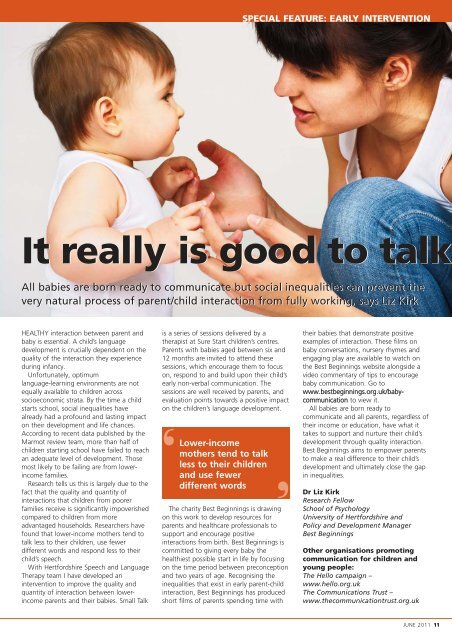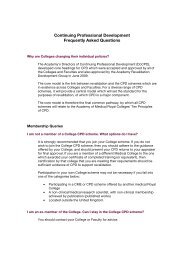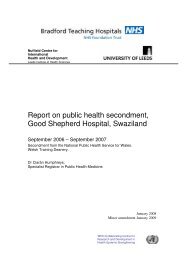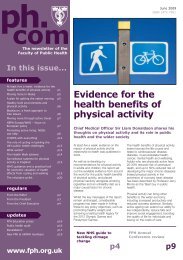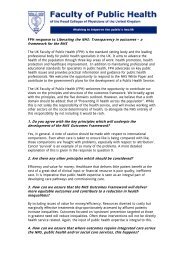PHT June 2011_Jan 10 - UK Faculty of Public Health
PHT June 2011_Jan 10 - UK Faculty of Public Health
PHT June 2011_Jan 10 - UK Faculty of Public Health
Create successful ePaper yourself
Turn your PDF publications into a flip-book with our unique Google optimized e-Paper software.
SPECIAL FEATURE: EARLY INTERVENTION<br />
It really is good to talk<br />
All babies are born ready to communicate but social inequalities can prevent the<br />
very natural process <strong>of</strong> parent/child interaction from fully working, says Liz Kirk<br />
HEALTHY interaction between parent and<br />
baby is essential. A child’s language<br />
development is crucially dependent on the<br />
quality <strong>of</strong> the interaction they experience<br />
during infancy.<br />
Unfortunately, optimum<br />
language-learning environments are not<br />
equally available to children across<br />
socioeconomic strata. By the time a child<br />
starts school, social inequalities have<br />
already had a pr<strong>of</strong>ound and lasting impact<br />
on their development and life chances.<br />
According to recent data published by the<br />
Marmot review team, more than half <strong>of</strong><br />
children starting school have failed to reach<br />
an adequate level <strong>of</strong> development. Those<br />
most likely to be failing are from lowerincome<br />
families.<br />
Research tells us this is largely due to the<br />
fact that the quality and quantity <strong>of</strong><br />
interactions that children from poorer<br />
families receive is significantly impoverished<br />
compared to children from more<br />
advantaged households. Researchers have<br />
found that lower-income mothers tend to<br />
talk less to their children, use fewer<br />
different words and respond less to their<br />
child’s speech.<br />
With Hertfordshire Speech and Language<br />
Therapy team I have developed an<br />
intervention to improve the quality and<br />
quantity <strong>of</strong> interaction between lowerincome<br />
parents and their babies. Small Talk<br />
is a series <strong>of</strong> sessions delivered by a<br />
therapist at Sure Start children’s centres.<br />
Parents with babies aged between six and<br />
12 months are invited to attend these<br />
sessions, which encourage them to focus<br />
on, respond to and build upon their child’s<br />
early non-verbal communication. The<br />
sessions are well received by parents, and<br />
evaluation points towards a positive impact<br />
on the children’s language development.<br />
Lower-income<br />
mothers tend to talk<br />
less to their children<br />
and use fewer<br />
‘different words<br />
‘<br />
The charity Best Beginnings is drawing<br />
on this work to develop resources for<br />
parents and healthcare pr<strong>of</strong>essionals to<br />
support and encourage positive<br />
interactions from birth. Best Beginnings is<br />
committed to giving every baby the<br />
healthiest possible start in life by focusing<br />
on the time period between preconception<br />
and two years <strong>of</strong> age. Recognising the<br />
inequalities that exist in early parent-child<br />
interaction, Best Beginnings has produced<br />
short films <strong>of</strong> parents spending time with<br />
their babies that demonstrate positive<br />
examples <strong>of</strong> interaction. These films on<br />
baby conversations, nursery rhymes and<br />
engaging play are available to watch on<br />
the Best Beginnings website alongside a<br />
video commentary <strong>of</strong> tips to encourage<br />
baby communication. Go to<br />
www.bestbeginnings.org.uk/babycommunication<br />
to view it.<br />
All babies are born ready to<br />
communicate and all parents, regardless <strong>of</strong><br />
their income or education, have what it<br />
takes to support and nurture their child’s<br />
development through quality interaction.<br />
Best Beginnings aims to empower parents<br />
to make a real difference to their child’s<br />
development and ultimately close the gap<br />
in inequalities.<br />
Dr Liz Kirk<br />
Research Fellow<br />
School <strong>of</strong> Psychology<br />
University <strong>of</strong> Hertfordshire and<br />
Policy and Development Manager<br />
Best Beginnings<br />
Other organisations promoting<br />
communication for children and<br />
young people:<br />
The Hello campaign –<br />
www.hello.org.uk<br />
The Communications Trust –<br />
www.thecommunicationtrust.org.uk<br />
JUNE <strong>2011</strong> 11


